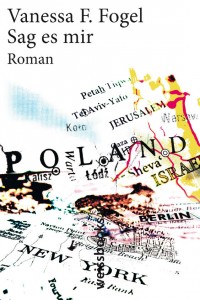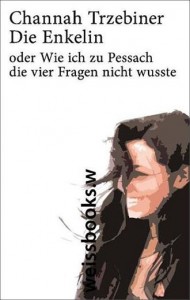or “Being who I am”
“The night before I fly to Germany to see my grandfather Mosha, I meet someone, take him home with me, and for the first time in my life, I sleep with a man.”
This sentence begins the first chapter of the 2010 novel Sag es mir (Tell it to me) by Vanessa F. Fogel. The author was born in 1981 in Frankfurt and grew up in Israel. She introduces the first-person narrator of this autobiographical novel both as a granddaughter and as a confident young woman right from the start. And despite her imminent trip to the sites of extermination – she meets her grandfather in Berlin and they travel together to Poland – her emphasis is on vitality and the joys of living.
The Frankfurt publishing house weissbooks has now taken on another Jewish writer of “the third generation.” Channah Trzebiner is a lawyer, also born in 1981 in Frankfurt, where, unlike Fogel, she still lives. She has written Die Enkelin (The Granddaughter), which is more of “a kind of inner monologue” than a novel. This book also begins confidently: “I accept the woman that I am.” At once, however, the author alerts her reader to the difficult process underlying this claim:
“For years I cut off my connection to the innermost ‘I’ […], so that I could be the substitute for a life ended by murder. How I could have done otherwise? I’m called Channah after my grandmother’s youngest sister […].”
Channah grew up in Germany, the granddaughter of Holocaust survivors. She describes how her grandmother embraces in her the murdered sister and how her grandfather, who “had a father’s influence on her”, kicked the dog, Joy, because he couldn’t stand to hear the carefree laughter she stimulated in the family. Channah mentions that – the night before a visit to the Bergen-Belsen concentration camp – she does not sleep with her (non-Jewish) boyfriend. And how, when her aunt calls to tell her another story about her grandmother, she takes “the condoms and bright pink nail polish” out of her shopping cart, putting them back “in disgust.” While Fogel ends her novel with “a little smile on my face” and a character called David Stern (Stern meaning ‘star’ in German) offering the New Year’s greetings “Shana tova,” Trzebiner’s last sentences read:
“What remains after such a catastrophe? Broken relationships. On both sides.”
Despite being framed this way, the autobiographical text wins the reader over with its hope and wit. The grandfather especially is flawed – he steals, and he’s a philandering womanizer – and yet lovingly described: “After all, Auschwitz wasn’t your average reform school, as some would have it. They took so much away from him; what are a few bananas and apples now?” The fact that the dialogue with the grandparents is written in Yiddish also adds to the book’s charm. When the narrator is seven years old, for instance, her grandmother shares some pearls of wisdom about men – that they’re good for nothing and you only need them for having children:
“Mener toign nischt. Mener woln blois ein sach. Fargis dus nischt. A mul ken es helfn zum leibn. A mul jo. […] Mer broichn sei nischt. Blois di sach.”
(Men are good for nothing. Men just want one thing. Don’t forget it. Once it can help for life. Once, yes. […] We do not need them. Just the one thing.)
All in all, one senses the author’s aspiration to enlighten her readers. She questions the proportionality of reparations and dismantles the rumor that Jews don’t pay taxes. In the appendix there’s a glossary of Yiddish terms as well as the four questions about Passover that are mentioned in the book’s subtitle. It was clearly also written for “clueless” non-Jewish Germans Trzebiner’s age, about whom she wonders: “when will people finally understand that an ostracism of this kind requires a timeframe of its own for forgiveness.” Her diagnosis echoes a statement that the author Robert Schindel, born in 1944, made this year at a reading. In answer to the question of how long the Holocaust would continue to have an effect on Germans and Jews, he answered biblically: “at least unto the seventh generation.” Trzebiner resolutely lays bare the way that the crimes of the past still continue to affect the present day, “because it’s a strain to pretend that the past plays no role today, even as it influences me right down to the smallest decisions.” Her book also addresses questions of female and middle-class identity, outlining a kind of programmatic subjectivity:
“I want to be allowed to be the woman I am.”
Mirjam Bitter, Media
Channah Trzebiner, Die Enkelin oder Wie ich zu Pessach die vier Fragen nicht wusste, Frankfurt: weissbooks 2013, 242 pages. In German.
Vanessa F. Fogel, Sag es mir. Novel, Frankfurt: weissbooks 2010, 334 pages. In German.
PS: The author will read at the museum tomorrow, 17 September 2013. To the event calendar …



This message is for Channah Trzebiner from Barbara born to holocaust survivor Natan Trzebiner. His mother was Chana Trzebiner of Pilica , Poland. We share a rare last name and wish to know how and if we are related.
Please contact me
Barbara